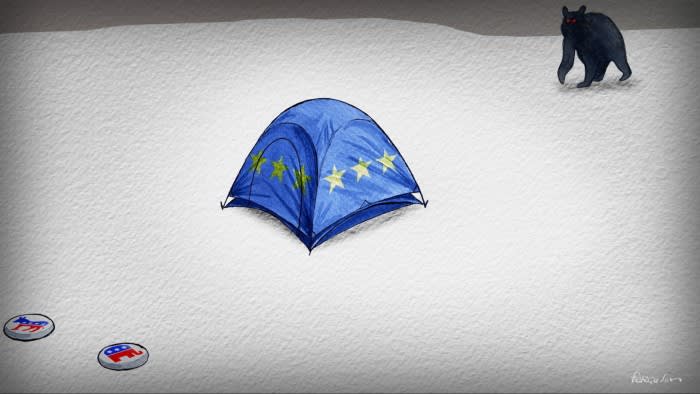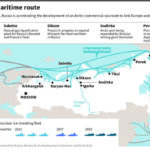Summary by Geopolist | Istanbul Center for Geopolitics:
The article explores the potential impact of Kamala Harris’s entry into the US presidential race on Europe, particularly in the context of the Ukraine crisis.
During the Ukraine crisis, Joe Biden has been a strong ally to Europe. However, concerns are growing about his chances against Donald Trump, who is seen as a threat to NATO and European security.
Kamala Harris’s candidacy is viewed with cautious optimism. She has shown commitment to NATO and Ukraine, which is seen as a positive development. However, there is concern that her entry into the race may lead to European complacency about security issues.
The article also highlights a shift in US political currents, with a growing focus on China rather than Europe. This shift suggests that regardless of the election outcome, Europe may need to take more responsibility for its own security. This could involve increased defense spending and strategic autonomy.
Emmanuel Macron’s push for European “strategic autonomy,” a relevant but sometimes controversial concept, is mentioned. The article advises Europe to prepare for all possible scenarios, including the potential destabilizing effects of a Trump victory, which could weaken NATO and alter global security dynamics.
Read more below.
Europe shouldn’t count on a Harris White House
You could touch the relief in European capitals at Kamala Harris’s entry into the US presidential race. Sure, Joe Biden had been a good friend to the continent in the wake of Vladimir Putin’s war against Ukraine. But Europe cannot be sentimental about these things. Didn’t the opinion polls say the 81-year-old was all but certain to lose the White House to Donald Trump?
European views of the relationship with the US tend to oscillate between complacency and insecurity, interspersed with occasional bouts of resentment. For most of this year, the organising emotion has been the second of the three — fear that Trump would win and read the rites over the US security guarantee. The danger now is that Harris’s candidature has invited complacency back into the conversation.
The nightmare, diplomats will tell you, has been of a freshly reinaugurated Trump calling a summit of the Nato alliance in February 2025. Arriving at its headquarters in Brussels, he says that he is on his way to Moscow for talks with his old pal Vladimir Putin. There, he boasts, the two hard men of global affairs will set the terms of a ceasefire in Ukraine.
To encourage Volodymyr Zelenskyy to accept, Trump will tell the Ukrainian president that if he insists on pursuing attempts to regain Russian-occupied territory he will shut down supplies of American aid and military equipment to Kyiv. His fellow Nato leaders are thus presented with a choice. They can back a sellout to Putin (and say goodbye to a post-cold war European order built on the inviolability of national borders), or they can see the US walk away from the most successful alliance in history. Heads Putin wins, tails Europe loses.
Not a great deal is known about Harris’s worldview, but her public statements have been reassuring. “For President Biden and me, our sacred commitment to Nato remains ironclad,” she told this year’s Munich Security Conference. So did support for Ukraine. It helps that her chief foreign policy adviser Philip Gordon is a transatlantic true believer who made his diplomatic career engaging with America’s European allies.
Europe would be unwise to get ahead of itself. Pulling level with Trump three months before polling day is not enough. Nor is the enthusiasm for Harris sufficient guarantee. Hillary Clinton secured a near-three-million majority in the popular vote in 2016. Harris has to win in the right states. Pennsylvania, Wisconsin and Minnesota come to mind.
The European temptation to view Harris’s candidacy as a get-out-of-jail-free card also misses an underlying shift. Whatever the outcome in November, Biden was the last visceral Atlanticist in the White House. He was first elected to the Senate in 1972, the year Washington ratified its first nuclear arms treaty with the Soviet Union. His personal compass was thus set by the cold war alliance with Europe. The commitment has been emotional as well as strategic.
Much as Harris may appreciate the worth of Nato to America’s national security (Trump has never understood that giving in to Putin on Ukraine would badly weaken the US in a confrontation with China), Biden, because of his age, was an outlier. Barack Obama announced the American tilt to Asia before Trump reached the White House.
The political currents in the US are pulling in two directions. The first leans towards a traditional isolationism that says America should abjure anything resembling a global leadership role; the second says that the enemy is China and Europeans should be left to look after themselves. Such views are not confined to the populist right. There are plenty of Democrats wondering whether the US should not take a narrower view of the national interest. Harris, if she is elected, will not be immune from the pressures.
The inescapable conclusion for Europeans is that sooner or later they will have to take responsibility for their own security, whether through the construction of an effective European pillar within Nato or, if Trump is elected, from what remains of the alliance. Emmanuel Macron calls this strategic autonomy or sovereignty. He is right, though the French president is sometimes not helped by the Gaullist flavour of his pronouncements.
The starting point is a step increase in defence spending. Add to that an EU defence industrial strategy to build capable forces, political structures for joint decision-making that disarm the vetoes of those who prefer to side with Putin, and institutions to operate sanctions against aggressors and provide military support and financial aid for allies.
Europe has taken steps in this direction in support of Ukraine. At times governments have surprised themselves at their capacity to act quickly when faced with a crisis. The fighting in Ukraine, however, is not a singular event. Rather, it offers sight of the emerging might-is-right world throwing over comfortable assumptions of the post-cold war order.
A victory for Trump in the US presidential election would present an immediate threat to the cohesion of the west’s advanced democracies. The reverberations of his disdain for Nato would reach far beyond Europe by putting a question mark over the security guarantees enjoyed by American allies such as Japan and South Korea. Europeans can be forgiven for hoping for the best. As long as they also prepare for the worst.
Source: Financial Times







